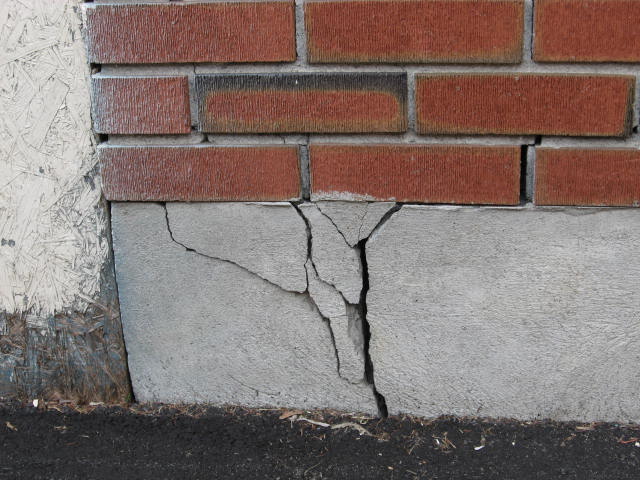Foundation Cracks
When you walk into your basement and notice a foundation crack, you’re first thought may be that your house is about to collapse around your ears. The truth is that not all foundation cracks are the same. There are cracks that are a problem and should send you to the phone to call a foundation expert. There are also those cracks that shouldn’t keep you up at night.
Common causes for cracks in your foundation:
Foundation cracks can occur for a number of reasons. If you have a concrete slab foundation, you may notice some cracks that have occurred on the floor or on the foundation walls. These may have resulted from the drying and curing of the concrete.
Cracks may also develop due to extreme temperature changes. Cracks may form as the basement goes through freezing and thawing cycles during changes in temperature from winter to spring.
Another common cause of foundation cracks is increased hydrostatic pressure. This occurs when a lot of water collects in the soil around the foundation of the home. This results in increased pressure on the wall of the foundation which can cause cracks.
When to get worried
Cracks vary in size, shape and location. There are cracks that are horizontal, vertical, step-like and those that run along floors or walls. As a general rule, it is important to have the cracks checked if you can fit a dime into them.
Step cracks are common in brick and block foundations. These cracks form along the joints of the bricks and blocks. They therefore take the appearance of steps. These cracks are serious as they can allow water from the surrounding soil into the basement. However, cracks that occur in the blocks themselves are even more serious and require the attention of a foundation specialist.
Large vertical cracks that continue to grow longer and wider in concrete slab foundations are a bad sign. They may result in the collapse of your foundation eventually if the situation is not corrected. Such cases may require extensive foundation work including mud jacking.
The appearance of horizontal cracks can also be an indication of something serious. These types of cracks can result from hydrostatic pressure as well as expansion and contraction of concrete during thawing and freezing cycles.
For your safety and peace of mind, it is always advisable to have your foundation cracks checked by a professional. This will ensure that any problems are addressed as soon as possible.

Rob VanSuilichem
Serving Michigan homeowners for over 32 years, Everdry is one of the Nation’s largest and most experienced waterproofer. Locally owned, operated and staffed, Everdry professionals take a personal one-on-one approach in educating homeowners so they truly understand all their options for creating a safe, dry, healthy and usable space in their basements.
What Sets Us Apart
- Unbeatable quality due to the experience of the owners and staff.
- Unbeatable value due to the efficiency and expertise of more than 32 years of experience.
- Unbeatable value due to the purchasing power of being one of the largest waterproofers in the nation.
- Unbeatable service due to the fact that EverDry is a locally owned and operated company.
Credentials Include:
- Members of the Home Builders Association
- H.U.D. evaluated
- I.C.C. evaluated (Report #94-07)
- Better Business Bureau Accredited with the Eastern and Western Michigan BBB
- Fully Licensed and Insured
The aforementioned memberships are important because we benefit from the constant exchange of information and knowledge. We are updated on everything from installation techniques, to customer service improvements. You benefit in the knowledge that these third party inspection agencies require us to meet stringent requirements to remain members in good standing.
Better Business Bureau
We have been nominated and won the prestigious Better Business Bureau’s Torch Award for Ethics many times, Chosen as a W.Mich.BBB Torch finalist in 2014 & 2015, Won the Torch Award for Ethics in 2016, Won the Eastern Michigan BBB Torch Award in 2019 and was also chosen as a Western Michigan BBB Torch finalist in 2019. Won the Eastern Michigan BBB Torch Award in 2023 and Finalist for the Western Michigan BBB Torch Award in 2020 & 2021!
Mission Statement
To create raving fans of our customers and employees through frequent contact, constant training, a commitment to excellence and unlimited opportunity.

